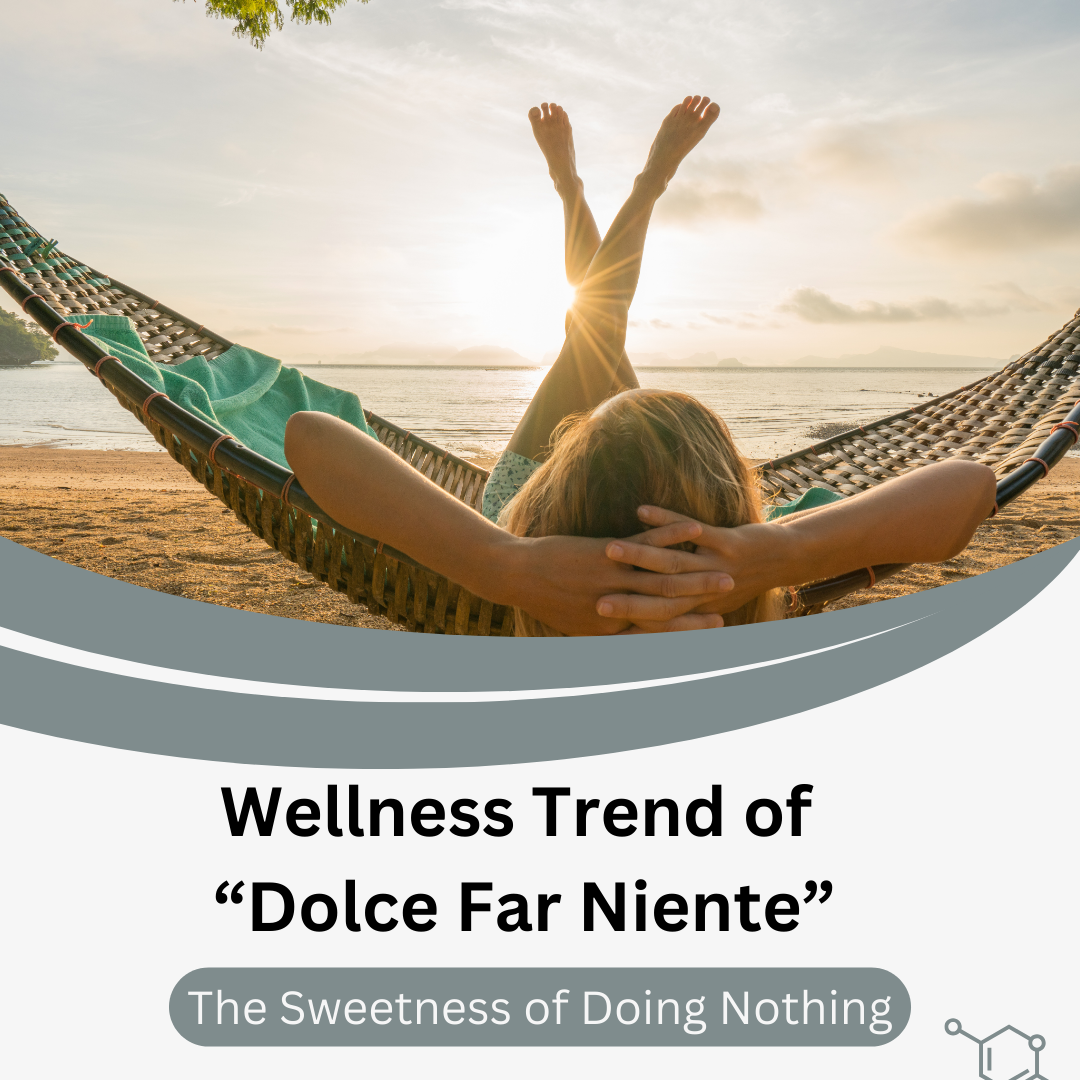
Embracing the Wellness Trend of Dolce Far Niente: The Sweetness of Doing Nothing
Share
Embracing the Wellness Trend of Dolce Far Niente: The Sweetness of Doing Nothing
In a world constantly on the go, where productivity is king and schedules are packed from morning till night, the idea of slowing down and doing nothing feels almost radical. Yet, this very concept is gaining momentum in the wellness world in 2024. Enter dolce far niente, an Italian phrase that translates to "the sweetness of doing nothing." This simple yet profound philosophy invites us to pause, breathe, and savour the present moment without the pressure of tasks, goals, or to-do lists. As we face a society grappling with overstimulation, burnout, and stress, dolce far niente emerges as a refreshing antidote to our over-scheduled lives.
Andrea Quadrio Curzio, co-founder of QC Spa of Wonders, perfectly encapsulates this shift in mindset. "As a society, we're overstressed, over-scheduled, and overtired, leaving little room for joy and wonder, or open-ended self-care," Curzio explains. "But we've begun seeing the pendulum swing in the other direction. We now aspire to achieve the work-life balance that Italians are famous for, and practicing doing nothing—clearing your brain and schedule—is the first step on the road to true wonder and relaxation."
Right here we will explore the philosophy behind dolce far niente, its connection to wellness, and how embracing the sweetness of doing nothing can transform your mental, emotional, and even physical health. Let's dive into this beautiful Italian tradition and how it can help us find balance in an increasingly hectic world.
The Origins of Dolce Far Niente
Dolce far niente is a deeply embedded part of Italian culture, an approach to life that celebrates leisure, pleasure, and living in the moment. Italians have long been known for their ability to enjoy the simple things in life—whether that's savouring a well-made espresso in a bustling piazza, taking a slow stroll through cobbled streets, or simply sitting by the seaside with no agenda in mind. This appreciation of time, with no pressure to achieve or perform, is at the heart of dolce far niente.
Historically, this mindset is deeply connected to Italy's rich cultural heritage, where art, beauty, and creativity thrive. The Renaissance, after all, was a period where Italy led the world in philosophy, art, and thought, yet this era was also marked by a sense of leisure and contemplation. This balance of productivity and stillness is one of the reasons Italy continues to be a wellspring of inspiration for people around the world.
But dolce far niente is more than just enjoying leisure; it’s about the intentional practice of slowing down and giving yourself permission to simply be. In the modern wellness context, it means stepping away from the relentless grind of daily life and rediscovering the joy of quiet moments and open-ended time.
Why the World Needs Dolce Far Niente
In 2024, we are living in a culture that values hustle and accomplishment above all else. There's a societal obsession with productivity, constantly being plugged in, and the glorification of busyness. For many, success is measured by how much you can squeeze into a day, leaving little time to pause or reflect.
As a result, burnout, anxiety, and stress are becoming endemic. A 2023 study by the World Health Organization reported that stress-related illnesses and mental health challenges were at an all-time high globally. This is where dolce far niente can offer a new path forward. It reminds us that true well-being isn't just about accomplishing tasks or meeting deadlines—it's also about taking the time to recharge, reset, and embrace stillness.
In recent years, various wellness trends have focused on mindfulness, meditation, and self-care. But dolce far niente offers something subtly different: it's not about achieving a zen-like state or reaching a particular outcome. Instead, it’s about embracing non-productivity, valuing moments for their own sake, and finding beauty in simply being present.
The Mental and Emotional Benefits of Doing Nothing
It may seem counterintuitive, but practicing dolce far niente can have profound mental and emotional benefits. In our quest for constant achievement, we often ignore the necessity of rest. When we give ourselves the permission to do nothing, we allow our minds the opportunity to reset. This can lead to increased creativity, improved problem-solving, and a sense of mental clarity.
A study published in the journal Psychological Science found that periods of rest can significantly boost cognitive function and creativity. This makes sense when you consider that many of our best ideas come not when we're focused on work, but when we're in a relaxed state—daydreaming, taking a walk, or simply letting our minds wander.
Emotionally, dolce far niente encourages us to reconnect with ourselves. In the quiet moments of doing nothing, we can become more attuned to our feelings, desires, and needs. This kind of introspection can help reduce anxiety, as we're not constantly bombarding our minds with information or tasks. Instead, we create space to breathe and simply be. Over time, this practice can cultivate a deeper sense of contentment and peace.
Physical Benefits: The Healing Power of Rest
Beyond the mental and emotional advantages, dolce far niente also brings significant physical benefits. Chronic stress takes a heavy toll on the body, contributing to issues such as high blood pressure, weakened immune function, and sleep disorders. By incorporating intentional periods of rest and doing nothing, we can help reduce these negative effects and promote overall well-being.
One of the physical benefits of dolce far niente is its ability to lower stress hormones, particularly cortisol. When we slow down and rest, our bodies enter a parasympathetic state, also known as the "rest and digest" mode. This helps lower heart rate, reduce muscle tension, and promote digestion—all of which are crucial for maintaining a healthy body.
Additionally, practicing dolce far niente encourages better sleep, which is essential for physical recovery and overall health. Studies have shown that individuals who incorporate relaxation techniques, such as meditation or even just mindful idleness, tend to have improved sleep quality and duration.
How to Embrace Dolce Far Niente in Everyday Life
While the idea of doing nothing may seem simple, in practice, it can be surprisingly challenging, especially in a world where constant activity is the norm. However, you don’t need to make drastic changes to start incorporating dolce far niente into your life. Here are a few tips to help you get started:
-
Schedule Time for Nothing: This might sound paradoxical, but one way to embrace dolce far niente is to block out time in your schedule specifically for doing nothing. Whether it’s a 30-minute break in the middle of the day or a leisurely afternoon once a week, make room for unstructured time.
-
Disconnect from Technology: One of the biggest obstacles to dolce far niente is our constant connection to phones, laptops, and social media. To truly relax, it’s important to step away from screens and the barrage of notifications. Instead, spend time in nature, read a book, or simply sit in silence.
-
Practice Mindful Idleness: When you do set aside time for nothing, try to stay present in the moment. Rather than letting your mind drift to worries or future plans, focus on the sensations around you—the warmth of the sun, the sound of birds, or the taste of your coffee. This can help deepen your experience of relaxation.
-
Reframe Rest as Productive: Many of us feel guilty when we’re not being productive. However, it's important to remember that rest is a form of productivity in itself. It allows you to recharge, which ultimately leads to greater well-being and even improved performance in the long run.
-
Adopt a Slow Living Mindset: Beyond specific practices, dolce far niente is about embracing a slower pace of life. This could mean simplifying your daily routine, prioritizing quality over quantity, or focusing more on moments of joy and connection rather than ticking off tasks.
Dolce Far Niente: The Key to Balanced Living, TODAY!
As the wellness world continues to evolve, dolce far niente offers a refreshing reminder that balance, rest, and simplicity are essential components of a healthy, fulfilling life. In a world that often pushes us to do more, be more, and achieve more, the sweetness of doing nothing can be a radical act of self-care.
By embracing this Italian philosophy, we can rediscover the joy of unstructured time, reconnect with ourselves, and create space for creativity, reflection, and relaxation. In 2024, let dolce far niente be your guide to a more balanced, peaceful, and enriched life.
